Iranian Rapper Toomaj Salehi Transferred To Esfahan Prison
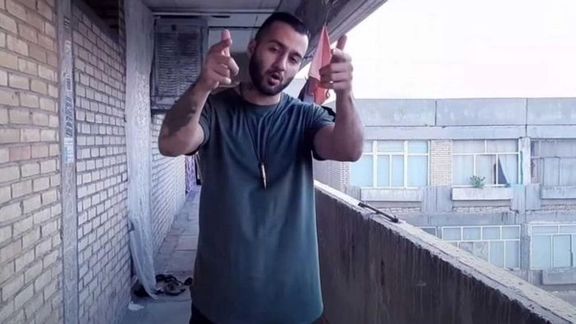
Dissident rapper Toomaj Salehi was transferred to Dastgerd Prison in Esfahan on Sunday after spending several days in undisclosed detention.

Dissident rapper Toomaj Salehi was transferred to Dastgerd Prison in Esfahan on Sunday after spending several days in undisclosed detention.
A fresh case has been initiated against him at the Revolutionary Court of Esfahan in the latest arrest just days after he was released from prison.
The 33-year-old artist was apprehended by plainclothes officers on a Babol street in northern Iran last Thursday. The arrest, reported without any judicial order, allegedly involved severe physical abuse, with officers purportedly using the butts of their AK-47 rifles and pistols.
Salehi had spent over a year behind bars, including 252 days in solitary confinement and was released on bail on November 18th. In response to his re-arrest, a trending campaign on Friday garnered over 75,000 mentions of Toomaj Salehi on the X social network, with many posts questioning his whereabouts.
Amir Raisian, Salehi's legal representative, posted on X: "Toomaj finally contacted his family today, stating that he was transferred to Dastgerd Prison yesterday afternoon."
Questions surround the authorization under which Toomaj was held from December 9 to December 12, especially considering the legal restriction on detentions exceeding one year, Raisian said.
Salehi rose to prominence for his protest songs addressing social issues and government injustices in Iran. His initial arrest in October 2022 was part of a broader crackdown on political opponents of the regime following the uprising sparked by the death in morality police custody of Mahsa Amini.
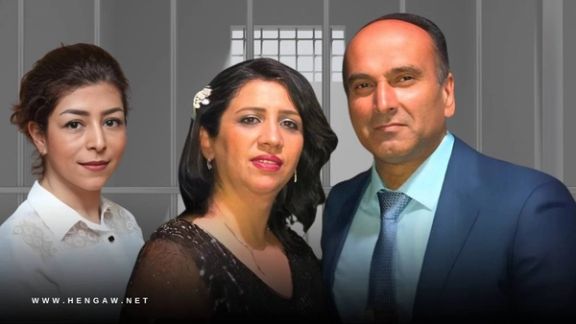
Three Baha'i citizens in northern Iran, have collectively been sentenced to 33 months of imprisonment for establishing and operating a daycare center.
According to the judgment issued on Saturday, Soha Sabeti received a sentence of 33 months of punitive imprisonment, a 13-year prohibition from engaging in any educational activities, and a cash penalty of approximately $750.
Similarly, Behrouz Rahmani and Sanaz Alizadeh Roshankouhi were each handed a 10-year ban on educational activities, accompanied by a cash penalty of around $500.
The charges include "managing and membership in groups, societies… within the country with the aim of undermining national security, promoting the interests of groups or organizations opposing the Islamic Republic system, engaging in educational activities, and promoting the Baha'i Faith."
The revolutionary court judge claimed the group were involved in educational activities and the implicit promotion of the Baha'i Faith, incorporating its principles and beliefs, especially aimed at children, forbidden under the Islamic Republic which only permits the practice of Christianity, Judaism, Zoroastrianism and Islam.
Recent weeks have witnessed a surge in pressure from security and judicial institutions targeting the roughly 300,000 strong Baha'i community.
Baha'is constitute the country's largest non-Muslim religious minority and have faced systematic persecution and harassment since the revolution of 1979 and the establishment of the Islamic Republic.
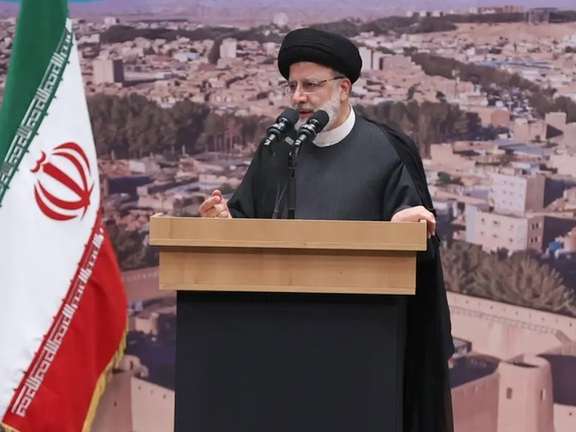
Deflecting accusations of gross violations of Iran's constitution against its people, President Ebrahim Raisi has stressed the country's constitutional commitment to Gaza.
Speaking at the 'Responsibility of Implementing the Constitution' conference on Sunday, Raisi stated that “supporting the oppressed is a fundamental duty outlined in the constitution", defending Gaza a tool to undermine its archenemy, Israel. Amidst the war in Gaza, triggered by Iran-backed Hamas's invasion of Israel on October 7, killing 1,200 mostly civilians and taking 240 more hostage, the regime's focus on Gaza has irked many who say it has abandoned its own people.
In September, lawmakers affiliated with the ultra-hardliner Paydari Party ratified the "Protection of Family Through Promotion of Hijab and Chastity Culture" bill as crackdowns on the mandatory hijab worsens. The legislation proposes penalties, including substantial fines, for women who do not adhere to the compulsory dress code, a policy that sparked nationwide protests.
During the protests following the death in morality police custody of Mahsa Amini, Iranians en mass have rejected the regime's hijab policy, which many argue is not in line with the constitution.
Raisi's reliance on the constitution contrasts with the backdrop of over 500 deaths caused by regime agents during the protests, along with thousands being arrested and tortured without access to a fair trial or legal representation.
The right to protest is recognized in Article 27 of the Iranian Constitution but various Iranian governments in the past four decades have refused to uphold this right and respect the Constitutional Law.
The human rights situation in Iran continues to raise concerns across various domains, continually violating the constitutional safeguards, as has been highlighted by international human rights organizations, including Amnesty International and Human Rights Watch. Key areas of concern include freedom of expression, political repression, religious freedom, capital punishment, treatment of minorities, arbitrary detention, and LGBTQ+ rights.
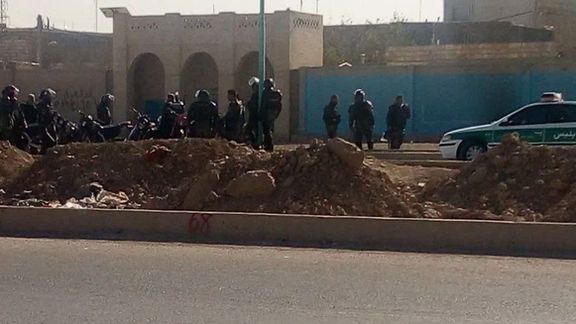
Iranians in Meybod took to the streets on Friday demanding the expulsion of illegal Afghans after a conflict between two groups led to the death of a young Iranian man.
The murder, believed to have been committed by an Afghan national, led to calls on the authorities to remove the Afghans residing illegally in the city. According to reports, among the 90,000 population of Meybod, approximately 12,000 are Afghan nationals.
The commander of the Yazd police, Abbasali Bahdani Fard, claims a suspect has been arrested, less than 15 hours after the street brawl on Friday.
Local sources have identified the victim as Amir-Reza Aghaei with another Iranian hospitalized.
Ali Akbar Azizi, the deputy governor of Yazd, informed IRNA state news agency that some Meybod residents demanded the arrest and punishment of the murderer during Friday prayers.
Social media videos, allegedly related to the Friday prayers in Meybod, depict visible public anger and protests. Some reports suggest that protesters targeted the Friday prayers Imam, the governor, and the commander of the city's IRGC during the demonstrations.
Increased security measures and the deployment of special forces in Meybod on Friday were also reported, with videos circulating on social media capturing the scenes.
Iran international cannot independently verify the accuracy of the videos.
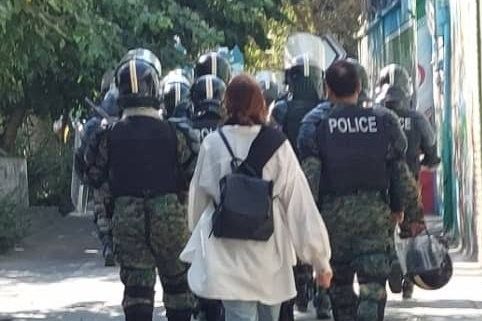
A base of the morality police in Afifabad Street, Shiraz, was set ablaze Saturday as hijab crackdowns reach unprecedented levels across Iran.
The incident follows more than a year of nationwide protests sparked by the death in morality police custody of Mahsa Amini last September, which has seen growing numbers of women in Iran rejecting the mandatory hijab.
Iran's parliament has since passed a stringent 'hijab bill' in mid-September, threatening violators with a severe penalty of up to ten years' imprisonment, in addition to stepping up morality police patrols and digital surveillance.
Women have been increasingly defiant ever since, going in public spaces such as shops, cafes and universities unveiled, and the regime has consequently deployed agents known as ‘hijab enforcers’ to public places.
Many hijab defiers have since been fined, jailed and banned from public spaces including schools and universities.
In late October, Armita Geravand, a 16-year-old student, succumbed to a head injury sustained during an encounter with Tehran's hijab enforcers in echoes of the death of Mahsa Amini one year before.
Armita fell into a coma on October 1st after being stopped by enforcers in the Tehran subway. While the government has not provided clear information about the incident, it appears that a female agent pushed her, leading to a severe head injury.
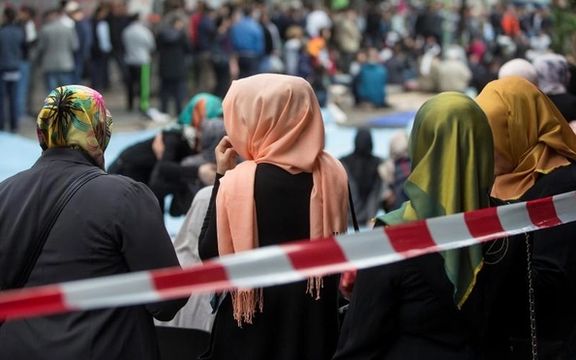
The German human rights commissioner who rebuffed Iranian female dissidents on Thursday, reportedly views the hijab as a form of emancipation for women.
The Iranian dissident, Masih Alinejad, pulled the plug on a meeting with the federal human rights commissioner, Luise Amtsberg, because Amtsberg did not wish to publicize the substance of the discussion.
The German magazine Stern reported in 2017 that the Green party politician had said she learned the head scarf can be a sign of emancipation, adding “We forget that sometimes.”
Amtsberg wrote her master’s thesis on “Feminism in Islam: Using the example of the Palestinian women’s movement.”
Lawdan Bazargan, a California-based Iranian-American political and human rights activist, told Iran International, “The hijab is an ideology, and like any ideological belief, it is linked to 'interests' and 'power.’ The hijab serves a dual function; it privileges veiled women in Islamic societies while also helping to reproduce the system's inherent patriarchy."
Bazargan, who is currently campaigning to secure the dismissal of Oberlin College’s Mohammad Jafar Mahallati, Iran’s former ambassador to the UN, added, “Ultimately, the hijab humiliates and disempowers women in society. It is shameful for a European woman, born and raised in a democratic country with liberal values, to idolize a symbol that oppresses millions of women, acting like a chain around their necks, suffocating them.”
Alinejad has long campaigned against the hijab. The Islamic Republic of Iran imposed the mandatory hijab on women after the 1979 revolution in 1981.
Iran International reported last week that the clerical regime has impounded the cars of people who violate the rules of the mandatory Hijab. In 2022, after dozens of Iranian women unveiled in public and sent their videos to Alinejad in New York, the clerical regime said women can be sentenced up to 10 years in jail for sending Alinjead the footage.
The outrage over Amtsberg’s attempt to silence the Iranian dissidents in Berlin has shined a new spotlight on the Green party’s overly cordial relationship with the Islamic Republic.
Amtsberg’s Green party has a long tradition of holding public meetings with Iranian regime officials and politicians who have denied the Holocaust, defended the use of stoning for adultery, and engaged in killing Iranians.
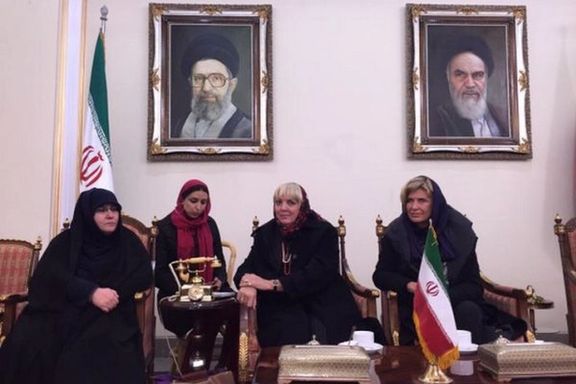
In 2019, Germany’s best-selling newspaper, Bild, published a series of news articles and an editorial titled “Shame on the Bundestag” that exposed the then-Green party Bundestag vice president Claudia Roth’s enthusiastic greeting of the former speaker of the Iran’s ersatz parliament, Ali Larijani.
Larijani defended former Iranian president Mahmoud Ahmadinejad’s denial of the Holocaust at the 2009 Munich Security Conference.
Roth is currently Germany’s cultural minister and, in 2010, met in Tehran with the former speaker's brother, Mohammad-Javad Larijani, who defended the stoning of people who committed adultery. Mohammad-Javad Larijani served as the head of the Iranian Human Rights Council. A year before Roth’s meeting, he denied the Holocaust at a German foreign ministry-sponsored event in Berlin held close to the Holocaust memorial.
Roth courted Manouchehr Mottaki who, while foreign minister, delivered a key speech at Tehran’s 2006 Holocaust denial conference.
The largely pro-Iran politician, Roth, also high-fived then-Iran ambassador to Germany, Reza Sheikh Attar, at the 2013 Munich Security Conference. Iranian Kurdish dissidents accused Attar of carrying out a massacre of Kurds during his tenure as governor of Kurdistan and West Azerbaijan provinces between 1980-1985.
The German foreign minister, Annalena Baerbock, has also faced intense criticism from German opposition politicians and Iranian dissidents for her dovish posture toward Tehran. Baerbock refuses to sanction the IRGC as a terrorist organization. She claims to practice a “feminist foreign policy” but her inaction toward the IRGC—a US-designated terrorist organization dedicated to enforcing the mandatory hijab—has sparked criticism from Alinejad and other Iranian dissidents.